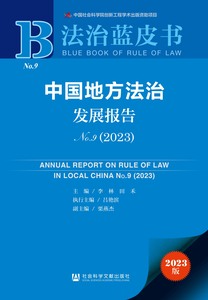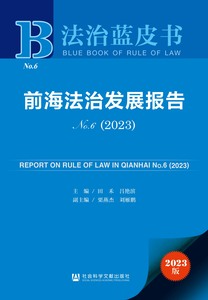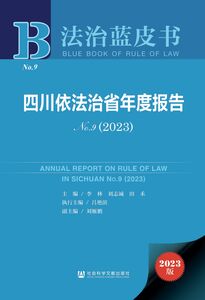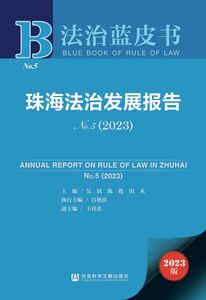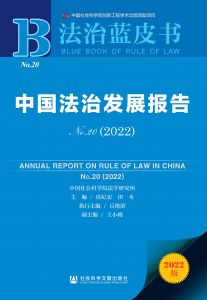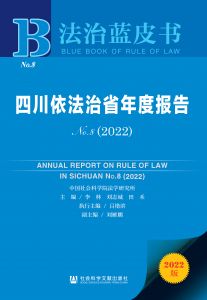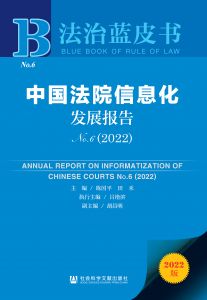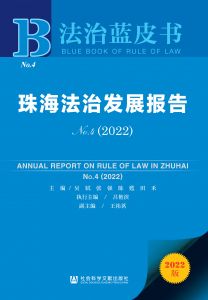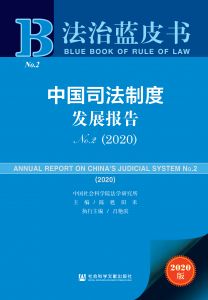- TA的作品
- 作品笔记(0)
- 作品书评(3)
-
李林 田禾 主编 吕艳滨 执行主编 栗燕杰 副主编 2023年12月 出版
关键词: 地方法治 法治政府 司法建设 法治社会 法治化营商环境
简 介:《中国地方法治发展报告No.9(2023)》回顾了中国各地法治的探索与实践,并对未来前景进行展望。全书对十余个地方的地方立法、法治政府、司法建设、法治化营商环境、社会治理等方面进行了剖析、研讨和提炼。 本卷地方法治蓝皮书就政府网站发展、公安机关法治政府、监狱制度发展等进行全国视野的观察,对法务区建设、检察公益诉讼、不诚信诉讼规则、小额案件执行、数字法庭、府检联动等热点前沿问题进行了专题研讨。值全面贯彻党的二十大精神的开局之际,本卷蓝皮书必将为各地提供可借鉴移植的示范样本,也将对于全国层面的法治顶层设计与改革完善提供宝贵资源。
¥ 83.4 试读
-
前海法治发展报告(No.6·2023) 收藏
田禾 吕艳滨 主编 栗燕杰 刘雁鹏 副主编 2023年11月 出版
简 介:《前海法治发展报告No.6(2023)》对前海法治建设经验、成果进行了全方位、多角度、多层次的提炼和总结。本书对前海的深化司法诚信体系建设、防范化解金融风险进行了详细探讨,对前海知识产权保护、国际商事仲裁进行了细致研究,对国际法律服务中心、域外法律查明进行了认真的分析,前海用好用足中央顶层设计的各项政策,充分发挥自身优势,坚持改革创新,为其他自贸区持续输出可复制、可借鉴的有益经验。此外,蓝皮书继续发布了前海法治建设的总报告和评估报告,总报告以定性方法全面总结过去一年前海法治发展的经验和成就,评估报告则以客观数据和客观材料为依据,对前海法治建设情况进行问诊把脉。
¥ 83.4 试读
-
实证法学研究(第8期) 收藏
田禾 吕艳滨 主编 王小梅 执行主编 2023年09月 出版
简 介:理论是实践的向导,本期《实证法学研究》以“理论探讨”开篇,刊发《行政行为撤销、废止解释论》,对行政行为撤销、废止的立法、学说及判例进行全方位考察,厘清撤销、废止行政行为的规范构造,进一步夯实了行政法学基础理论研究。本期设置“智慧法治”栏目,关注“党内法规数据库建设”“数据保护知识产权法治”“网络平台治理立法”,聚焦新时代新信息技术与法治的深度融合;在“司法制度”板块对民营企业家犯罪预防机制、刑罚执行、监狱刑事执行变更证据规则进行实证研究;“纠纷化解”板块围绕“另行起诉”在民事审判中的适用情况、检察机关在实质性化解行政争议中的作用、婚姻支付视角下彩礼返还问题、鉴定内容对医美纠纷责任法律效力等展开深层剖析。
¥ 54 试读
-
李林 刘志诚 田禾 主编 吕艳滨 执行主编 刘雁鹏 副主编 2023年05月 出版
简 介:2022年,四川坚持以习近平新时代中国特色社会主义思想为指导,认真学习贯彻党的二十大精神,全面贯彻习近平法治思想和习近平总书记来川视察重要指示精神,坚决落实党中央全面依法治国决策部署,共同推进依法治省、依法执政、依法行政,一体建设法治四川、法治政府、法治社会,全面推进四川各方面工作法治化,法治四川建设取得新成效。 本书系中国社会科学院法学研究所与四川省全面依法治省办联合发起,并由中国社会科学院法学研究所法治蓝皮书主创团队打造,共同服务四川法治建设的皮书品牌。本书旨在更好地推动四川全面依法治省工作,系统总结四川全面依法治省的成效,分析四川法治发展的经验,并对四川法治发展提出建议与展望,实现全省法治建设协同发展。
¥ 69.5 试读
-
珠海法治发展报告(No.5·2023) 收藏
吴轼 陈甦 田禾 主编 吕艳滨 执行主编 王祎茗 副主编 2023年05月 出版
简 介:法治蓝皮书《珠海法治发展报告No.5(2023》分析了珠海2022年法治建设总体情况,并从立法探索、法治政府、司法建设、跨境法治、社会治理角度,对珠海法治发展进行了全面总结分析,对未来珠海在习近平新时代中国特色社会主义思想的指导下,以珠澳社会治理合作为抓手,实施粤澳深度合作的区域法治协同战略,推动横琴粤澳深度合作区成为改革开放的窗口、法治建设的试验田和新高地,推动珠海高质量发展成为最安全稳定、最公平公正、法治环境最好的地区。 《珠海法治发展报告No.5(2022》全面梳理总结了2022年珠海法治实践的总体概况,并提出:未来,珠海将进一步聚焦珠澳深度合作,为实现高质量发展加强法规制度供给,构建现代产业体系,加强高水平科技创新,建设联动港澳的金融开放体系,在数字法治政府建设、营商环境优化、多元的公共法律服务等方面促进港澳人才、资本、信息、技术等要素在大湾区更便捷地流动,并以高质量司法服务保障更高水平对外开放,以更加完善社会治理体系、丰富多样的法治宣传教育,深化民生领域合作,加快实现与澳门的一体化发展,在坚持和完善“一国两制”上展现新担当、作出新贡献。
¥ 69.5 试读
-
中国法治发展报告(No.20·2022) 收藏
作者: 莫纪宏 田禾 主编 吕艳滨 执行主编 王小梅 副主编 出版时间:2022年06月
关键词: 全过程人民民主 全面依法治国 法治中国 法治政府 法治社会 涉外法治 共同富裕
简 介:本岀全面归纳了2021年中国立法、行政、民商经济、刑事法治、司法改革、社会法治、廉政建设等法治发展状况,并结合存在的问题对2022年中国法治发展形势进行了预测。书中专题分析了2021年中国人权保障、证券司法、公平竞争、企业合规、公益诉讼、生态保护、数字货币等领域的法治进展,并增设“涉外法治”专题,就统筹推进国内法治和涉外法治、中国法域外适用、境外裁决在中国境内的承认和执行、航空涉外法治等进行研究。本书继续推出中国政府透明度、中国司法透明度、中国检务透明度、中国警务透明度等系列年度指数评估报告,并推出中国法律普及与实施法治国情调研报告。
¥ 55.6 试读
-
作者: 陈国平 田禾 主编 吕艳滨 执行主编 胡昌明 副主编 出版时间:2022年05月
简 介:本书总结了2021年人民法院信息化建设成效和面临的问题,展望了2022年法院信息化建设前景,从智慧审判、智慧诉讼服务、智慧执行和司法大数据四个维度对全国3500余家法院的信息化建设进展情况进行了评估。此外,书中电子诉讼实践板块介绍了北京、山东等法院电子诉讼平台建设情况;智慧审判执行板块突出了江西、吉林、广东、江苏、浙江等地法院将最新科技运用于审判执行的工作成效;智慧审判管理板块展示了河南、河北、上海等地法院加强审判监督、为审判人员“智慧画像”等做法;智慧社会治理板块总结了四川、重庆等多家法院运用智慧手段参与社会治理的创新举措。
¥ 55.6 试读
-
珠海法治发展报告(No.4·2022) 收藏
作者: 吴轼 张强 陈甦 田禾 主编 吕艳滨 执行主编 王祎茗 副主编 出版时间:2022年05月
关键词: 粤港澳大湾区 珠海法治 横琴粤澳深度合作区 社会治理
简 介:本书全面梳理总结了2021年珠海法治实践的总体概况,并提出法治发展的未来目标:珠海将深入学习贯彻习近平法治思想,在法治政府、营商环境、社会治理、珠澳融合等方面开创新思路、新技术、新制度,增强大湾区司法互助互信,建立域内外多元解纷机制协同,增进港澳同胞民生福祉,以法治为核心价值观,助力珠海加快建设新时代中国特色社会主义现代化国际化经济特区,全力支持服务好横琴粤澳深度合作区建设。
¥ 55.6 试读
-
Third-Party Evaluation Report on “Judicial Big Data” in Chinese Courts (2019) 收藏
作者: 陈甦 田禾 主编 吕艳滨 执行主编 胡昌明 副主编 出版时间:2020年10月
关键词:
出处: Annual Report on Informatization of Chinese Courts No.4 (2020)
简 介:In 2019,courts at all levels paid close attention to data quality,ensured the accuracy and security of data,continuously improved data sharing,and deeply promoted judicial big data application,so as to provide support for serving social management innovation and strengthening smart management of the courts with judicial big data.
¥ 20.65 试读
-
Third-Party Evaluation Report on “Smart Enforcement” in Chinese Courts (2019) 收藏
作者: 陈甦 田禾 主编 吕艳滨 执行主编 胡昌明 副主编 出版时间:2020年10月
关键词:
出处: Annual Report on Informatization of Chinese Courts No.4 (2020)
简 介:The year 2019 was the first year for the Outline of the Fifth Five-Year Reform Program of the People’s Courts (2019—2023) to be implemented,and also the first year for the newly revised Five-Year Plan for Information-Based Construction in People’s Courts (2019—2023) to put into effect. Besides,it also marked the turning point for the people’s courts to switch the goal from a basic solution to an effective solution to enforcement difficulties. An important policy decision and arrangement was clearly made at the Fourth Plenary Session of the 18th CPC Central Committee that “enforcement difficulties shall be effectively solved” and that “the rights and interests of prevailing parties shall be guaranteed in a timely manner in accordance with law.” As far as the people’s courts are concerned,resolving the difficulties of enforcement is not an overnight solution,but a long-term systematic project. In March 2016,the Supreme People’s Court set the goal of “using two to three years to basically solve the enforcement difficulties”. After three years of unremitting efforts by the people’s courts across the country,as of the end of 2018,the people’s courts had undergone historic changes in enforcement and achieved leapfrog development. In this historical process,the information technology has played a vital role. In recent years,in the context of the national big data strategy,court informatization has progressed by leaps and bounds,promoting the reform of trial and enforcement mode and also alleviating to some extent the pressure of “few judges for many cases” in the people’s courts. Compared with the trial,the enforcement involves a vast geographic area and fragmented routine work,which provide a broader space for the information technology to play a role in. From inquiry and control of property subject to enforcement,handling and management of enforcement cases and a unified command of enforcement actions,to auction and disposition of property,joint credit discipline of dishonest judgment debtors and remote commissioning of enforcement matters,the information system has been playing a revolutionary role. It has not only improved the quality and efficiency of enforcement,but also reformed the system and mode of enforcement,and reshaped the ecological system of the enforcement in the people’s courts.
¥ 36.93 试读
-
Third-Party Evaluation Report on “Smart Trial” in Chinese Courts (2019) 收藏
作者: 陈甦 田禾 主编 吕艳滨 执行主编 胡昌明 副主编 出版时间:2020年10月
关键词:
出处: Annual Report on Informatization of Chinese Courts No.4 (2020)
简 介:Trial is one of the core tasks of the people’s courts,and “smart trial” is the focus and challenge in court informatization. The report of the Fourth Plenary Session of the 19th Central Committee of the Communist Party of China stressed that “we should establish and improve the rules and regulations for administrative management by using Internet,big data,artificial intelligence and other technical means. We should build a digital government and strengthen data sharing in an orderly manner”. The people’s courts also need to improve the intelligence level in the trial. In 2019,the people’s courts made a lot of effective attempts and efforts to improve the quality and efficiency of trial,serve judges in handling cases,serve judicial assistants and establish online litigation rules. Relying on big data resources and by providing support for judges to inquire and refer to similar cases,the people’s courts have made efforts to ensure accurate ascertainment of facts and correct application of laws,and promote unification of judgment standards. The people’s courts have provided more intelligent services for judges in handling cases through digital judicial committees. By building an electronic file management system and interfacing with the case handling platform,they have effectively solved the file transferring difficulties. Furthermore,by assisting judges in reading files,producing documents,and examining and approving the circulation,the people’s courts have effectively improved trial efficiency and eased the pressure of trial.
¥ 26.87 试读
-
of Chinese Courts in and Outlook for 2020 收藏
作者: 陈甦 田禾 主编 吕艳滨 执行主编 胡昌明 副主编 出版时间:2020年10月
关键词:
出处: Annual Report on Informatization of Chinese Courts No.4 (2020)
简 介:The development of court informatization is a major initiative by the people’s courts to implement the strategy for invigorating China through the Internet. The people’s courts at all levels have firmly grasped the major historical opportunities brought about by the new round of scientific and technological revolution,such as invigorating China through the Internet and building a digital China and a smart society. The courts have made full use of big data,cloud computing,artificial intelligence and other modern scientific and technological means to solve reform problems,enhance judicial efficiency,and promote judicial reform and intelligence and informatization development of the people’s courts;and they have provided strong scientific and technological support to promote the modernization of the trial system and trial capacity.
¥ 36.26 试读
-
《实证法学研究》约稿函 收藏
作者: 中国社会科学院法学研究所 中国社会科学院国家法治指数研究中心 主办 田禾 吕艳滨 主编 王小梅 执行主编 出版时间:2019年10月
关键词:
出处: 实证法学研究(第3期)
简 介:改革开放以来,中国法学研究和法治建设取得了举世瞩目的成就。党的十八届三中全会提出,“建设科学的法治建设指标体系和考评标准”,党的十八届四中全会吹响了全面推进依法治国的新号角,《中共中央关于全面推进依法治国若干重大问题的决定》明确提出,重要立法事项引入第三方评估,将风险评估、合法性审查确定为重大行政决策的必经程序。近年来,我国法学研究人员和法律工作者积极投身法治中国建设,形成了一系列重要理论和实证研究成果,对推动我国法治进步作出了重要贡献。 法学研究应当以推动社会发展进步为己任。为加强实证法学研究,凝聚学界共识,推动实证法学研究的理论发展,团结学界同人更好地参与法治建设实践,中国社会科学院法学研究所编撰出版《实证法学研究》,以期形成中国实证法学研究的综合性、权威性、创新性平台,打造中国实证法学的权威理论园地。
¥ 0.34 试读



